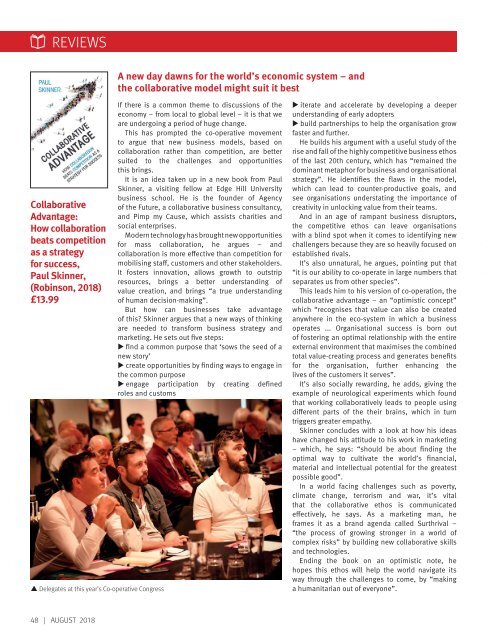AUGUST 2018
The August edition of Co-op News looks at how the co-operative movement can grow - but also thrive. Plus case studies from the US worker co-op movement, and how co-ops are embracing spoken word to tell the co-op story.
The August edition of Co-op News looks at how the co-operative movement can grow - but also thrive. Plus case studies from the US worker co-op movement, and how co-ops are embracing spoken word to tell the co-op story.
Create successful ePaper yourself
Turn your PDF publications into a flip-book with our unique Google optimized e-Paper software.
REVIEWS<br />
A new day dawns for the world’s economic system – and<br />
the collaborative model might suit it best<br />
Collaborative<br />
Advantage:<br />
How collaboration<br />
beats competition<br />
as a strategy<br />
for success,<br />
Paul Skinner,<br />
(Robinson, <strong>2018</strong>)<br />
£13.99<br />
p Delegates at this year’s Co-operative Congress<br />
If there is a common theme to discussions of the<br />
economy – from local to global level – it is that we<br />
are undergoing a period of huge change.<br />
This has prompted the co-operative movement<br />
to argue that new business models, based on<br />
collaboration rather than competition, are better<br />
suited to the challenges and opportunities<br />
this brings.<br />
It is an idea taken up in a new book from Paul<br />
Skinner, a visiting fellow at Edge Hill University<br />
business school. He is the founder of Agency<br />
of the Future, a collaborative business consultancy,<br />
and Pimp my Cause, which assists charities and<br />
social enterprises.<br />
Modern technology has brought new opportunities<br />
for mass collaboration, he argues – and<br />
collaboration is more effective than competition for<br />
mobilising staff, customers and other stakeholders.<br />
It fosters innovation, allows growth to outstrip<br />
resources, brings a better understanding of<br />
value creation, and brings “a true understanding<br />
of human decision-making”.<br />
But how can businesses take advantage<br />
of this? Skinner argues that a new ways of thinking<br />
are needed to transform business strategy and<br />
marketing. He sets out five steps:<br />
u find a common purpose that ‘sows the seed of a<br />
new story’<br />
u create opportunities by finding ways to engage in<br />
the common purpose<br />
u engage participation by creating defined<br />
roles and customs<br />
u iterate and accelerate by developing a deeper<br />
understanding of early adopters<br />
u build partnerships to help the organisation grow<br />
faster and further.<br />
He builds his argument with a useful study of the<br />
rise and fall of the highly competitive business ethos<br />
of the last 20th century, which has “remained the<br />
dominant metaphor for business and organisational<br />
strategy”. He identifies the flaws in the model,<br />
which can lead to counter-productive goals, and<br />
see organisations understating the importance of<br />
creativity in unlocking value from their teams.<br />
And in an age of rampant business disruptors,<br />
the competitive ethos can leave organisations<br />
with a blind spot when it comes to identifying new<br />
challengers because they are so heavily focused on<br />
established rivals.<br />
It’s also unnatural, he argues, pointing put that<br />
“it is our ability to co-operate in large numbers that<br />
separates us from other species”.<br />
This leads him to his version of co-operation, the<br />
collaborative advantage – an “optimistic concept”<br />
which “recognises that value can also be created<br />
anywhere in the eco-system in which a business<br />
operates ... Organisational success is born out<br />
of fostering an optimal relationship with the entire<br />
external environment that maximises the combined<br />
total value-creating process and generates benefits<br />
for the organisation, further enhancing the<br />
lives of the customers it serves”.<br />
It’s also socially rewarding, he adds, giving the<br />
example of neurological experiments which found<br />
that working collaboratively leads to people using<br />
different parts of the their brains, which in turn<br />
triggers greater empathy.<br />
Skinner concludes with a look at how his ideas<br />
have changed his attitude to his work in marketing<br />
– which, he says: “should be about finding the<br />
optimal way to cultivate the world’s financial,<br />
material and intellectual potential for the greatest<br />
possible good”.<br />
In a world facing challenges such as poverty,<br />
climate change, terrorism and war, it’s vital<br />
that the collaborative ethos is communicated<br />
effectively, he says. As a marketing man, he<br />
frames it as a brand agenda called Surthrival –<br />
“the process of growing stronger in a world of<br />
complex risks” by building new collaborative skills<br />
and technologies.<br />
Ending the book on an optimistic note, he<br />
hopes this ethos will help the world navigate its<br />
way through the challenges to come, by “making<br />
a humanitarian out of everyone”.<br />
48 | <strong>AUGUST</strong> <strong>2018</strong>


















